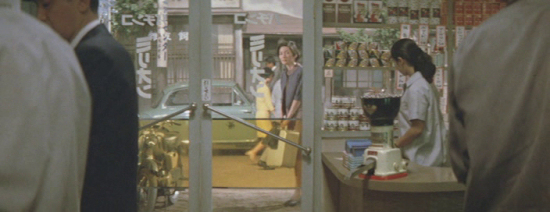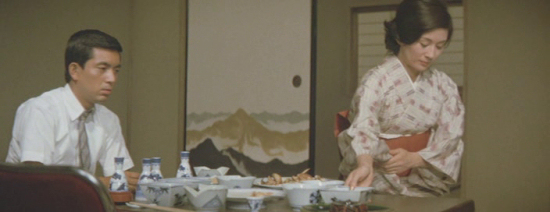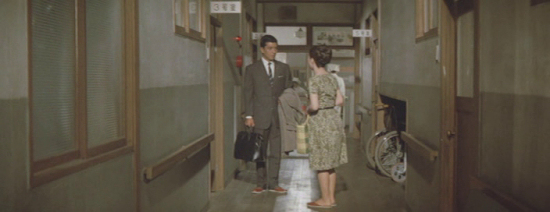
All the plans, habits, and expectations that form a person's existence within their professional and social spheres can became sources of pain after a single accident. Mikio Naruse's final film was 1967's Midaregumo (乱れ雲), its English titles being Two in the Shadow and Scattered Clouds, the latter title being closer to the Japanese and it reflects the central theme of the story about a young woman whose husband is killed and afterwards is constantly forced to confront echoes of the life she had been preparing to live with him. The movie isn't one of Naruse's strongest films, which usually succeed in credibly conveying the unhappiness that can manifest from relatively mundane circumstances but which sometimes employ melodrama. In this case, the melodrama diminishes the film a bit, but not so much that one can't appreciate what Naruse intended to do with it.
The film stars Yoko Tsukasa as Yumiko, the young widow, and Yuzo Kayama as Mr. Mishima, the young man whose car struck and killed Yumiko's husband. A court absolves Mishima of legal responsibility for the man's death, determining the culprit to be a flat tire rather than Mishima's driving. And indeed, Mishima seems to be a very conscientious young man since, despite the court's finding, he insists on giving Yumiko a large portion of his salary on a monthly basis.

Yumiko refuses at first but her friend convinces her to take it. She does need it, especially after the family of her late husband, who never liked her, manage to arrange it so she does not receive his pension. When she loses the baby in a vague couple of scenes between which one senses a scene was cut, she's removed from the family register. She's sent a letter from her husband's family encouraging her to remarry.

Financial misfortune is usually the keystone of Naruse movies. For the most part, they're stories of how dreams are slowly smothered over a lifetime by steadily increasing financial burdens of one kind or another. In this case, the pain caused by Yumiko's money problems is primarily in how they prevent her from moving on. She's forced to move back to her home village where she takes a job in her sister's hotel.

As luck and melodrama would have it, Mishima's work relocates him to the same village and he regularly brings clients to the hotel where Yumiko is forced to serve drinks while men crack jokes about the strange, quiet tension between herself and Mishima.
But there is genuine insight in the ways in which the characters are shown to handle the situation. Mishima hasn't seen anyone from Tokyo in a while so he remarks that seeing Yumiko is almost like seeing a family relation. The basic decency that prompted him to send her payments has gradually become a compulsion as he finds he cannot assuage his guilt. This is an interesting echo of one aspect of The Stranger Within a Woman and it seems feelings of guilt took on a prominence for Naruse in the 1960s.

It's an insidious circumstance because Yumiko wants nothing more than to forget Mishima's existence, and the memories connected to it, while Mishima continually endeavours to find the action he can take that will alleviate his feelings of guilt, which grow worse after his mother secretly meets with Yumiko, begging her to forgive him and Yumiko refuses. He begins to interpret his strong feelings about her as love.

Eventually, the two develop a confused romance, going on dates and Yumiko finds herself caring for him when he becomes ill. The movie does not seem to know how to resolve the situation and resorts to melodrama again. I suspect a stronger route would either have been to have two marry, which might have been interesting as a mistake or a success, or have the two forced to confront an inherent dysfunction in their feelings.
Like the other colour Naruse film I've seen, Daughters, Wives and a Mother, Scattered Clouds has a very consistent and definite palette. Everything is in olive tones; pale greens, beiges, and golds with occasional accents of red and powder blue.

I'm reminded again of Carl Dreyer's statement about how Japanese cinema was the first to develop a real artistic sensibility about colour filmmaking. The red accents like a signature are reminiscent of the red kettles Ozu would like to place in frame in his colour films but otherwise Ozu's colour films were distinctly different and featured more contrasts than Naruse's pea and peanut butter scheme. But Naruse's colour filmmaking certainly has a muted, delicate beauty.
Naruse's and Ozu's films shared many actors, in fact if one watches a lot of the great works of 1940s, 50s, and 60s Japanese cinema, one tends to see a lot of faces common among the works of Kurosawa, Mizoguchi, Ozu, and Naruse. Both of the stars of Scattered Clouds had previously appeared in Kurosawa films and there are several prominent supporting actors in the film, including a very conspicuous cameo from Bokuzen Hidari.

Perhaps I found myself dwelling on these familiar faces more because--as Ozu and Mizoguchi were dead at this point and Kurosawa was effectively exiled from the Japanese studio system--it's been said that Scattered Clouds marked the end of an era in Japanese humanist filmmaking.
Twitter Sonnet #507
Unnamed cancerous doughnuts die in heat.
Moisture in the provolone provokes space.
The red rose brought blushing shame to the beet.
And back to the doughnut; sugar's a race.
Alcove olives calm the alligator.
Complex phoney strawberries slow frame rate.
Harmony's tea has upset the satyr.
Rubber horses are thrown at the glass gate.
Arches quizzed the ponderous bowling balls.
Viking songs slur where strikes reverberate.
Shy ghosts shuffled index cards through the halls.
Music cleans lint from the wood vertebrate.
Dramatic tackle cramps the easy fish.
More eggs are scrambled by satellite dish.

No comments:
Post a Comment